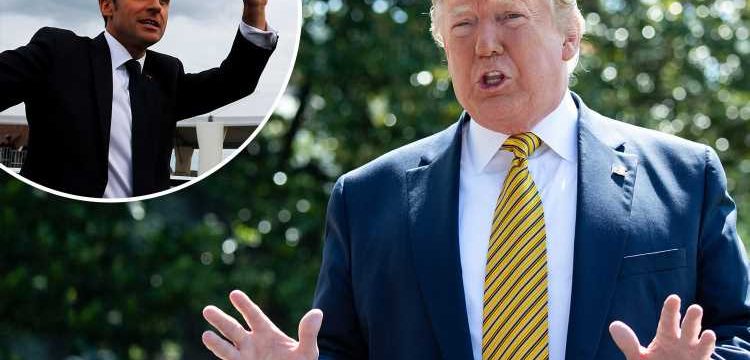DONALD Trump has laced into European leaders over their complaints about the increasing nuclear tension between the US and Iran.
The president blasted the EU’s leadership saying they were exclusively worried about being hit in the pocket by new sanctions.
Last week Trump pulled out at the last minute from launching a retaliatory strike on the Islamic Republic after they downed a US drone over the Persian Gulf.
He reportedly changed his mind about blasting Iran after learning 150 people would have been killed, but made it clear military action remained firmly on the table.
Launching into one of his trademark eviscerations The Donald told NBC: “I don’t care about Europeans.
“The Europeans are going out and making a lot of money."
Singling out Emmanuel Macron's government he added: “In France, they’re selling cars to Iran.
“They’re doing other things.
“And let me tell you, we’re very good to Europe. We take care of them. NATO, we spend a tremendous amount.
“On trade, the European Union’s taken, really, they have really taken advantage of us for a long time.”
He added: "I’m not looking for war, and if there is, it’ll be obliteration like you’ve never seen before. But I’m not looking to do that."
Relations in the region began to worsen significantly when Trump pulled out of a 2015 nuclear deal between Iran and six powers and reimposed sanctions on the country.
The sanctions had been lifted under the pact in return for Tehran curbing its controversial nuclear programme.
Iran has said it would respond firmly to any threat against it and warned earlier today of the risks of a military confrontation.
Recent US and Iran tensions
- May 5: USS Abraham Lincoln carrier strike group and a bomber task force is deployed in Middle East in response to 'a number of troubling and escalatory indications and warnings' by Iran.
- May 8: Iran vows to enrich its uranium stockpile if world powers fail to negotiate new terms for its nuclear deal. The US responds by imposing sanctions on Iran's metals industry.
- May 10: The US says it will move a Patriot missile battery into the Middle East to counter threats from Iran.
- May 24: President Trump says the US will bolster its military presence in the Middle East with an additional 1,500 troops.
- May 12: The UAE says four commercial ships off its eastern coast "were subjected to sabotage operations," just hours after Iranian and Lebanese media outlets air false reports of explosions at a nearby Emirati port.
- June 13: Two oil tankers are attacked in the Gulf of Oman – Washington blames Iran while Tehran denies involvement
- June 18: US sends more than 1,000 additional troops to Middle East citing Iran's 'hostile behaviour'
- June 20: Iran shoots down American 'spy' drone insisting the aircraft had flown over its airspace – a claim the US denied
"If a conflict breaks out in the region, no country would be able to manage its scope and timing," Major General Gholamali Rashid said, according to the Fars news agency.
"The American government must act responsibly to protect the lives of American troops by avoiding misconduct in the region."
Iranian President Hassan has already accused the Americans of stoking tensions in the Gulf through what Iran has called the violation of its airspace by the US military drone.
ART OF THE DEAL What is the Iran nuclear deal?
BROKERED by the Obama White House and signed by seven world powers in 2015, the Iran nuclear deal aimed to reduce the country's ability to produce nuclear weapons.
However, Donald Trump withdrew from the deal earlier this month which he called a "horrible, one-sided deal".
The deal was an agreement between the Islamic Republic and a group of world powers aimed at scrapping the Middle Eastern country's nuclear weapons programme.
The deal saw Iran agree to eliminate its stockpile of medium-enriched uranium by 98 per cent.
But in May 2019 Trump withdrew from the 2015 nuclear agreement which he called a "horrible, one-sided deal", saying it did not address Iran's ballistic missile activities and check in its regional behaviour.
The US has now threatened to impose the "strongest sanctions in history" against Iran.
Secretary of State Mike Pompeo laid out 12 demands for Iran and said relief from economic sanctions would only come when Washington had seen tangible shifts in Iran's policies.
He warned: "The sting of sanctions will be painful if the regime does not change its course from the unacceptable and unproductive path it has chosen to one that rejoins the league of nations."
Iran would also have to walk away from core pillars of its foreign policy, including its involvement in Syria, Yemen, Lebanon and Afghanistan.
Washington said the aircraft was targeted in international air space in "an unprovoked attack".
Yesterday, Foreign Secretary and Conservative leadership candidate Jeremy Hunt said Britain could back America in a military attack on the Shi’ite theocracy.
He said: “We will stand by the United States as our strongest ally but of course we have to consider any requests for military support on a case-by-case basis.
“We do strongly believe that the solution is for Iran to stop its destabilising activity throughout the Middle East and we are very concerned about the sabotaging of tankers that has happened recently, which is almost certainly Iran, and we’re constantly in touch with the United States.
“We want to de-escalate the situation but we are of course extremely worried.”
In recent years, British forces have joined their American counterparts in conflicts in Iraq, Afghanistan and Libya.
Source: Read Full Article



